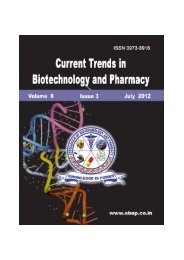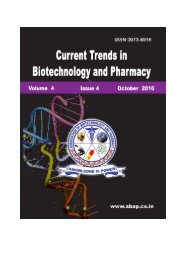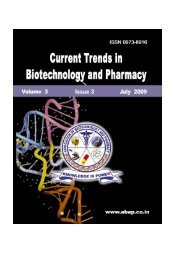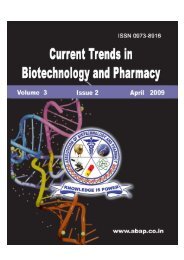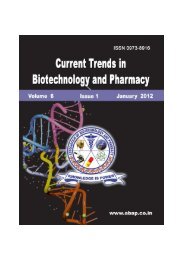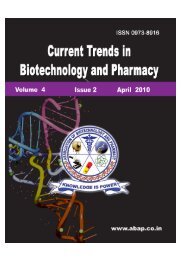d(GC) - Association of Biotechnology and Pharmacy
d(GC) - Association of Biotechnology and Pharmacy
d(GC) - Association of Biotechnology and Pharmacy
Create successful ePaper yourself
Turn your PDF publications into a flip-book with our unique Google optimized e-Paper software.
Current Trends in <strong>Biotechnology</strong> <strong>and</strong> <strong>Pharmacy</strong><br />
Vol. 6 (2) 119-144 April 2012, ISSN 0973-8916 (Print), 2230-7303 (Online)<br />
genotyping GISTs for the c-kit <strong>and</strong> pdgfra<br />
mutations present are tools in determining the<br />
utility <strong>of</strong> imatinib for GIST patients.<br />
However, resistance to imatinib occurs in<br />
14% <strong>of</strong> the patients after 6 months <strong>of</strong> treatment<br />
<strong>and</strong> 50% <strong>of</strong> patients after 2 years <strong>of</strong> treatment<br />
(94, 95). Resistance mechanisms include the<br />
activation <strong>of</strong> alternative downstream signaling<br />
pathways, activation <strong>of</strong> other tyrosine kinase<br />
receptors, the loss <strong>of</strong> KIT expression <strong>and</strong> the<br />
development <strong>of</strong> secondary mutations in c-kit or<br />
pdgfra (96). Patients with treatment failure after<br />
initial success may demonstrate tumors which<br />
have developed second, activating mutations in<br />
exons 13, 14 <strong>and</strong> 17 <strong>of</strong> c-kit, or very rarely, in<br />
pdgfra (97). Therapeutic failure together with the<br />
presence <strong>of</strong> such secondary mutations allows<br />
identification <strong>of</strong> patients which may benefit from<br />
an alternative TKI therapy, sunitinib, which inhibits<br />
KIT, PDGFRA <strong>and</strong> the angiogenic vascular<br />
endothelial growth factor receptors (VEGFRs)<br />
(98).<br />
Our group recently published one <strong>of</strong> few<br />
Latin American studies to evaluate the mutational<br />
status <strong>of</strong> the KIT/PDGFRA oncoproteins in clinical<br />
samples (99). We examined the histopathologic<br />
features <strong>of</strong> paraffin-embedded tumor tissues <strong>and</strong><br />
the mutations in c-kit <strong>and</strong> pdgfra genes from 39<br />
archived Panamanian cases, 1994-2004. The<br />
highest frequency <strong>of</strong> mutations was in exon 11<br />
<strong>of</strong> the c-kit gene (70%), while mutations at a lower<br />
frequency were found in c-kit exon 9 <strong>and</strong> pdgfra<br />
exon 18. The results obtained in that study for<br />
c-kit <strong>and</strong> pdfgra validated our laboratory’s<br />
developing program <strong>of</strong> personalized mutational<br />
analysis, which also involves using EGFR <strong>and</strong><br />
KRAS for lung <strong>and</strong> colon cancers, respectively.<br />
Applying personalized medicine for cancer<br />
in the developing world : Cancers <strong>of</strong><br />
importance in the developing world are those with<br />
high incidences <strong>of</strong> morbidity <strong>and</strong> mortality, those<br />
affecting young people <strong>and</strong> cancers for which<br />
survival rates are relatively lower. Three cancers<br />
with high incidence in low- <strong>and</strong> middle-income<br />
countries are lung, colorectal <strong>and</strong> breast cancers<br />
Developing world personalized cancer medicine<br />
131<br />
<strong>and</strong> in the previous section, applications <strong>of</strong><br />
personalized medicine were examined for these.<br />
It was noted that these cancers not only share a<br />
similar significance for their impact on developing<br />
world patients, but similarity in the genetic<br />
mutations <strong>and</strong> biochemical dysfunctions that are<br />
at their basis.<br />
These commonalities may guide diagnostic<br />
laboratories with limited resources to develop a<br />
concise portfolio <strong>of</strong> genetic tests that will provide<br />
maximum benefit for the greatest number <strong>of</strong><br />
cancer patients, including:<br />
1. EGFR genotyping <strong>of</strong> exons 18-20 for lung<br />
cancer patients, <strong>and</strong> immunohistochemical<br />
analysis <strong>of</strong> EGFR for colorectal cancer;<br />
2. KRAS genotyping <strong>of</strong> codons 12 <strong>and</strong> 13 for<br />
lung <strong>and</strong> colorectal cancers;<br />
3. MSH2, MLH1 <strong>and</strong> APC genotyping;<br />
microsatellite instability tests using BAT25,<br />
BAT26, D5S346, D2S123 <strong>and</strong> D17S250<br />
markers; <strong>and</strong> immunohistochemical tests for<br />
MLH1, MSH2, MSH6 <strong>and</strong> PSM2 for<br />
colorectal cancer patients;<br />
4. BRCA1 <strong>and</strong> BRCA2 screening <strong>and</strong> MSH2<br />
<strong>and</strong> MLH1 genotyping for breast cancer<br />
patients <strong>and</strong> their families;<br />
5. HER2 immunohistochemistry or FISH<br />
analysis for breast cancer patients; <strong>and</strong>,<br />
6. KIT immunohistochemistry <strong>and</strong> genotyping <strong>of</strong><br />
c-kit (exons 9, 11, 13, 14 <strong>and</strong> 17) <strong>and</strong> pdgfra<br />
(exons 12, 14 <strong>and</strong> 18) for GIST patients.<br />
In this section, the technical aspects <strong>of</strong><br />
implementing such tests are briefly reviewed. A<br />
second group <strong>of</strong> tests for the genes BRAF, PI-<br />
3K or PTEN, TP53 <strong>and</strong> CDH1 or their products<br />
could also be introduced, once st<strong>and</strong>ardized tests<br />
have been developed for these genes, <strong>and</strong> after<br />
the primary tests proposed above are established<br />
in laboratories.<br />
EGFR testing: Protocols for PCR <strong>and</strong> Sanger<br />
sequencing <strong>of</strong> EGFR for lung cancer patients<br />
from genomic DNA are available in the



